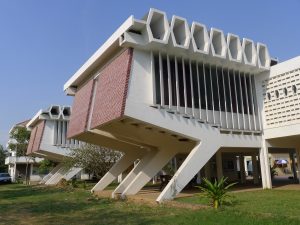The Australian author Darryl Collins spent almost three decades documenting Cambodia’s cultural heritage and working to restore this country’s museums after the many years of war. He died at home in Siem Reap on Wednesday. He was 76.
His latest book “Cambodian Wooden Houses: 1,500 Years of Khmer Heritage” was described as “crucial” by Deputy Prime Minister Chea Sophara “especially [for] younger generations – to ensure they understand, and appreciate the need for preserving their heritage.”
Friends and those who worked with Collins said he would be sadly missed.
“Collins was widely admired for his work,” said long-time friend Helen Jarvis. Messages of sadness overwhelmed by appreciation of his contributions to Cambodia have continued to pour in since the news of his death several days ago.
“Also widely applauded are his practical achievements in lovingly restoring and reviving old houses – from the popular Chinese House in Phnom Penh to the fine wooden examples that he moved from various places to his home in Siem Reap,” she added.
Collins arrived in Cambodia in 1994 as part of an Australian government grant to revitalize the National Museum in Phnom Penh. He returned briefly to Australia, to resign from his position at the National Gallery in Canberra.
He lectured at the Department of Archaeology at the Royal University of Fine Arts between 1998 and 2002 and then spent two years as an advisor to the Department of Culture and Research at the APSARA National Authority in Siem Reap.
“The deep affection and respect with which so many of them speak of him continues even after his passing, and their achievements as Cambodia’s new generation of scholars and practitioners will go on to stand as an important part of his legacy,” Jarvis said.
Between 2004 and 2013, Collins served as staff manager at the National Museum for inventory and database projects which digitally recorded and photographed the museum’s entire collection.
Importantly, he co-authored two groundbreaking books on Cambodia’s architectural heritage.
His first was a collaboration with British architect Helen Grant Ross, “Building Cambodia: New Khmer Architecture 1953-1970.”
“Darryl’s death is a great loss to Cambodia,” said long-time Australian friend Peter Starr. “We first met shortly after he started work at the National Museum in Phnom Penh in 1994.
“About a decade later, he asked me to edit his book ‘New Khmer Architecture’ which celebrated the designs of a new generation of Cambodian architects following Independence in 1953. These were a fusion of modernist styles with local traditions.
“Published in 2006, the book quickly sold out and is now unfortunately out of print,” Starr said.
Starr said the second book he edited, “Cambodian Wooden Houses,” published last year, was “Darryl’s life work, dedicated to the carpentry skills of Cambodian tradesmen.”
Drawing from his extensive library of books and photographs amassed over the years, “he documented how building materials and designs of Cambodian houses had remained almost unchanged for 1,500 years.”
“He strongly believed that preserving examples of such houses was in the national interest. I very much hope the book is translated into Khmer,” Starr said.
Another long-time friend and former Cambodia-based librarian, Margaret Bywater, said Collins had emerged as a well-known community figure after he moved to Siem Reap in 2008 and that he was widely respected for his knowledge of Khmer history and culture.
She also praised Collins for his generosity and his ability to nurture young talent.
“He encouraged many young Cambodians to pursue further study overseas,” Bywater said. “Darryl shared his knowledge with students, the general public and other scholars and interested visitors to the kingdom.”

































